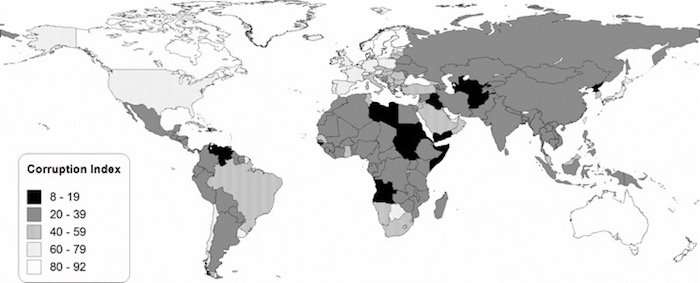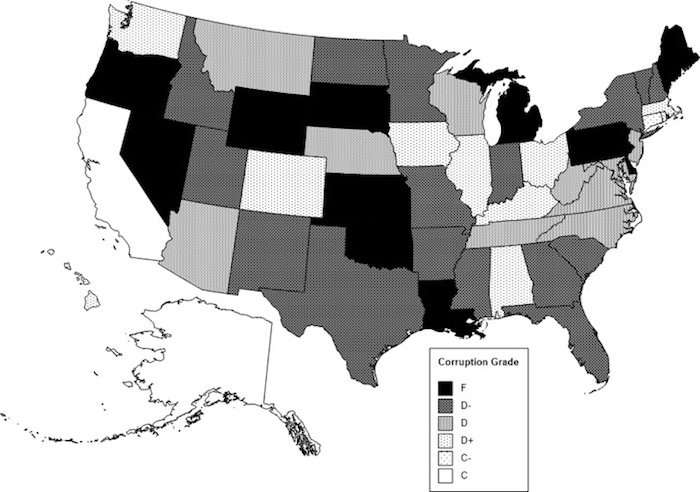Geographer brings fresh perspective to study of US, world corruption in new books

A few years ago, Barney Warf wondered why no geographer yet had undertaken a major study of corruption. The geography professor at the University of Kansas said his field is uniquely well-suited to the study of fraudulent, dishonest or criminal conduct—like accepting bribes—by people in power, both in the U.S. and globally.
"Geography is the study of space, the way that history is the study of time," Warf said. "Everything occurs in time and space, but they've emerged as different disciplines. Historians have been good at showing corruption isn't new—it changes over time. But I'm essentially the only geographer I know of looking at corruption. Geography is a way of getting a handle on how and why corruption varies among places, why isn't it a problem in Scandinavia and why it's so severe in the Middle East, for example. A spatial perspective gives us a sense of the unevenness of corruption and that it can have very different impacts in different places."
Now, Warf is behind two new books that bring a geographer's point of view to the topic.
One, "Handbook on the Geographies of Corruption" (Elgar, 2018), for which Warf served as editor, brings together a host of geographers to look at "the immense variation of corruption among nations, and how this reflects levels of wealth, the centralization of power, colonial legacies and different national cultures."
Warf put together the edited volume beginning with a series of thematic chapters examining corruption from different conceptional perspectives like corruption and gender, or corruption and electronic government.
"When governments use computers to distribute payments, it cuts out opportunities for corruption," Warf said. "The gender chapter was written by two women who examine if corruption reflects a sense of male entitlement, and if governments run by women tend to be less corrupt—and there's empirical evidence for that. There are also national case studies of corruption in Mexico, Brazil, Ukraine, Russia, Turkey and Pakistan written by people who know these countries in great depth."
In the other book, "Global Corruption from a Geographic Perspective" (forthcoming from Springer), Warf tackles corruption as a sole author.
"In the course of putting the edited volume together, I thought if nobody is going to write about corruption, then I am—so my monograph was inspired by the edited volume, but I cover a far larger number of countries," he said. "I tried to draw out similarities among countries in terms of corrupting causes like dynastic families in power like El Salvador, the Philippines or Zimbabwe, or corruption from the drug trade as in Afghanistan and Colombia, or transnational corruption that is becoming more common, like the Russian mafia operating in Pacific islands and international corporations bribing officials in Papua New Guinea or Brazil—that's done a number on forest preservation, fisheries and wildlife protection around the world."
Warf used data collected by Transparency International to rank and map the world's nations according to their levels of corruption.

"The most corrupt countries tend to be dictatorships, like China, Iran, Eritrea, and Turkmenistan, and it tends to be lower in democracies with checks and balances," he said. "The most corrupt country is North Korea, and the least corrupt is Sweden or Norway, and Singapore is up there, too. Corrupt countries tend to have very porous borders, and the two institutions viewed as most corrupt around the world are police and customs officials. When you have porous borders, it becomes easier for transnational criminal organizations to bribe officials and smuggle things like ivory or drugs."
Even within nations, the KU researcher said there can be stark differences in the geography of corruption.
"Corruption in India is much greater in the Ganges River Valley than in the south, and corruption among different U.S. states varies," Warf said. "It tends to be higher in southern states, for example."
Warf has created world and U.S. maps of corruption from Transparency International's ratings. He said the U.S. was somewhat of an outlier among democracies, even with a Constitution promising checks and balances on political power.
"I become interested in the long and rich history of American corruption going back to the Credit Mobilier scandal in the 19th century to Teapot Dome in the 1920s," Warf said. "With the role of campaign finance and lobbying, I came to conclude the U.S. looks good in indices, but the reason why is that we've legalized corruption in the U.S. We've made bribery of officials in U.S. legal. Corporations spend $100 million per year per member of Congress—so it shouldn't surprise us that corporations have undue influence."
Within the U.S., Warf said there are state-by-state variations in the severity of corruption.
"Historically, Louisiana is most corrupt U.S. state going back to Huey Long in the 1930s," he said. "But if you look at convicted public officials, it's Illinois. Illinois has had more senators and governors convicted—the last three governors of Illinois are in sitting in jail. Blagojevich tried to sell Obama's Senate seat. New York also has a long tradition of being highly corrupt."
Despite campaign pledges to clean up influence peddling and sweetheart deals for political insiders in Washington, D.C., Warf pulled no punches describing the current administration as a low point in the annals of American corruption.
"The Trump administration is most corrupt we've ever had, from a White House that advertises Ivanka's jewelry to foreign governments putting up officials in Trump Hotel, to Trump golf courses using the presidential seal, the administration has routinely violated the emoluments clause of the Constitution," he said. "But they just don't care—it's like, 'We're going to use government as a piggy bank.' They didn't 'drain the swamp'—they expanded the swamp and filled it with alligators."
Provided by University of Kansas
















